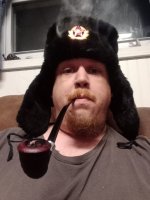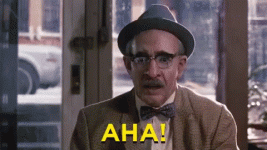Tobacco is Sacred
- Thread starter Winnipeger
- Start date
You are using an out of date browser. It may not display this or other websites correctly.
You should upgrade or use an alternative browser.
You should upgrade or use an alternative browser.
SmokingPipes.com Updates
Watch for Updates Twice a Week
- Status
- Not open for further replies.
I really enjoy that museum, particularly the Nonesuch ship, I have lived in Winnipeg for 6 years in the past so have walked through a few times...Wow. That museum is interesting. Isn't it ironic that the treaty medals given to the tribal chiefs are in the hands of the museum? It's crazy to me that that exhibit still exists (meaning the museum in its entirety), what with all the animal carcasses and colonial ghosts. To me it's a throwback, but I mean, the exhibits haven't changed since I was a kid 40 years ago.
WTF were you doing in Winnipeg???



Colonial ghosts and throwback all make sense to me in the context of a museum, I guess I only find it as absurd as everything else our species does, including smoking...and internet forums where we call each other tender.
My wife is Canadian, we came back for a white Christmas. I amplified my Canadian winter experience by clearing and flooding the rinks most evenings down at R A Steen community centre in Wolseley...
Colonialism is itself not an atrocity, it is a fact of life, it has been carried out to some degree by every single culture and people group on the planet, throughout all time periods. Have some atrocities taken place during the colonization of various places throughout history? Of course, I don't think anyone argues that. An honest question, do you not think that the various "indigenous" peoples of the world got where they were without colonizing a different place and displacing, killing, or assimilating the people there?This involves the history of tobacco. Colonialism is apart of that history and is, like all atrocities, has a need to be acknowledged.
Since 1997 there has been a concerted propaganda campaign from the CCP, especially in Canada, to link any and all evils of "colonialism" to the British Empire and its offspring, mainly as an attempt to distract from their own ongoing colonization of the South China Sea and Africa, as well as their "economic colonialism" of buying property and businesses in the English speaking former British colonies. You can see this demonstrated instantly by making a comment on any Chinese media about their Uighur atrocities, you will immediately be responded to by Chinese trolls shouting Native whataboutism.
Disclaimer: My family is part native (not enough to get cheap tobacco though, sadly), so you can't be offended.

The Nonsuch exhibit is indeed cool. I love the recreation of old Winnipeg too. I hadn't been to the museum in a long long time, (though I was part of a film production onboard the Nonsuch about a decade ago), but now that I have a young child we've been visiting there semi-regularly. I try to read all the plaques now, and take in everything, which I never did as a kid. Of course, at the same time I need to chase my daughter and her friends around when we visit there. The place is a maze. Easy to lose small children.I really enjoy that museum, particularly the Nonesuch ship, I have lived in Winnipeg for 6 years in the past so have walked through a few times...
Colonial ghosts and throwback all make sense to me in the context of a museum, I guess I only find it as absurd as everything else our species does, including smoking...and internet forums where we call each other tender.
My wife is Canadian, we came back for a white Christmas. I amplified my Canadian winter experience by clearing and flooding the rinks most evenings down at R A Steen community centre in Wolseley...
The "throwback" comment had to do with the fact that the exhibits, as far as I remember them, are mostly unchanged since I was a kid. So the museum seems to me like a throwback to the eighties. Like, the museum has become a museum of itself in my mind. It's like stepping back 40 years in time when I walk past the Bison at the entrance, and the Nonsuch even smells the same, eliciting intense sense memories.
I guess "colonial" and "colonialism" are trigger words for some people. Who knew?
I live a few blocks away from R.A. Steen Community Centre. We'll try to get out there to skate on your ice when this cold snap lifts a little! Bad windchill right now. Not many people venturing outside.
It's complicated.Colonialism is itself not an atrocity, it is a fact of life, it has been carried out to some degree by every single culture and people group on the planet, throughout all time periods. Have some atrocities taken place during the colonization of various places throughout history? Of course, I don't think anyone argues that. An honest question, do you not think that the various "indigenous" peoples of the world got where they were without colonizing a different place and displacing, killing, or assimilating the people there?
Since 1997 there has been a concerted propaganda campaign from the CCP, especially in Canada, to link any and all evils of "colonialism" to the British Empire and its offspring, mainly as an attempt to distract from their own ongoing colonization of the South China Sea and Africa, as well as their "economic colonialism" of buying property and businesses in the English speaking former British colonies. You can see this demonstrated instantly by making a comment on any Chinese media about their Uighur atrocities, you will immediately be responded to by Chinese trolls shouting Native whataboutism.
Disclaimer: My family is part native (not enough to get cheap tobacco though, sadly), so you can't be offended.
I think the Native cigarettes use a very different tobacco than the tobacco smoked in pipes around drum circles. Native is touted as all natural grown plants with no additives but I think they use Burley and Virginias like other cigarettes. I could be wrong.I've been smoking Native (that's what it says on the pack) full flavor cigarettes for 17+ years. Are they good? you ask. I'll tell you this: my wife, an occasional smoker, prefers them to Camel
Colonialism: domination of a people or area by a foreign state or nation : the practice of extending and maintaining a nation's political and economic control over another people or area.Colonialism is itself not an atrocity, it is a fact of life, it has been carried out to some degree by every single culture and people group on the planet, throughout all time periods. Have some atrocities taken place during the colonization of various places throughout history? Of course, I don't think anyone argues that. An honest question, do you not think that the various "indigenous" peoples of the world got where they were without colonizing a different place and displacing, killing, or assimilating the people there?
Since 1997 there has been a concerted propaganda campaign from the CCP, especially in Canada, to link any and all evils of "colonialism" to the British Empire and its offspring, mainly as an attempt to distract from their own ongoing colonization of the South China Sea and Africa, as well as their "economic colonialism" of buying property and businesses in the English speaking former British colonies. You can see this demonstrated instantly by making a comment on any Chinese media about their Uighur atrocities, you will immediately be responded to by Chinese trolls shouting Native whataboutism.
Disclaimer: My family is part native (not enough to get cheap tobacco though, sadly), so you can't be offended.
Miriam-Webster Dictionary.
Tobacco's history is wrought with controversy.I’m impressed that the moderators let this thread go. Bully for their Laissez Faire attitude to such an informative & entertaining show of passionate opinions on “Sacred Tobacco”. This has been sacrilicious.️
View attachment 279413
I would argue that the religionists would likely cringe just the same. They are primarily the ones who spearheaded such atrocities against indigenous peoples in years past, after all (they just used the Inquisition as a template). Which of course only serves to confirm how connected with the Spirit and the life force energy these indigenous people all were (I hope some of them still are), even with each group separated by both time and great distances.
Which is precisely why tobacco is so demonized.
White people converted the sacred herb of the Native Americans into a cash crop and major industry the same way we made chocolate and coffee and beer and booze into profitable addictions, instead of delicacies.
To this day alcohol is forbidden to be sold on the reservations and the neighboring state of Nebraska only shut down liquor sales right off the reservation in 2017.

Liquid genocide: alcohol destroyed Pine Ridge reservation – then they fought back
For years, 11,000 cans of beer a day were poured into the Pine Ridge Indian reservation, causing untold damages. This summer, it finally stopped
Before 1492 the Native Americans had some very mild fermented drinks that were, like their tobacco, used for medical and ceremonial and religious reasons.
White men brought “fire water” and little cotton sacks of North Carolina golden Virginia tobacco.
My particular ancestor who rode with the 12th Missouri on the 1865 Powder River Expedition left no journals but others did.
The troopers were so addicted to commercial tobacco they smoked sage grass when supllies of the real stuff weren’t available. And they wrote the Indian scouts and friendly tribes they dealt with if they got ahold of “soldier’s tobacco” would call in all their friends and smoke it all with relish until it was all gone.
My people volunteered to put down the rebellion and exterminate common thieves and brigands who raped, stole, pillaged and murdered under the cover of a war. Uniformed Confederates were given quarter and parole but but Bushwhackers in gray and Jayhawkers in blue uniforms were summarily executed.
The 8th MSM troopers had refused to leave Missouri, but the younger kids of the 12th Missouri were the tip of the Union spear against Nathaniel Bedford Forest at Nashville and effectively ended organized Confederate operations in Tennessee.
Then they loaded the 12th Missouri into boats to send them West to put down Red Cloud, Sitting Bull and Roman Nose.

Powder River Expedition (1865) - Wikipedia
On September 8, 1865 my great grandfather was 20 years old, six foot four, born to the saddle, and was assigned to the Company M, rear guard black horse troop, at Broadus, Montana.
At the order to charge Roman Nose wisely decided to die another day.
Xxxxxx
On September 8, 1865, the over 2,000 United States soldiers and civilians of Colonel Cole's and Walker's column's were marching South, up Powder River in Montana Territory. Unbeknownst to them, a village of Over 2,500 Cheyenne, Sioux, and Arapaho including the Cheyenne chief Roman Nose, were camped less than ten miles away. When discovering this, the Cheyenne, Sioux, and Arapaho warriors, not wanting the soldiers to attack their village, attacked the soldiers first. The soldiers' lead guard, was marching about one quarter of a mile ahead of the column. This command was hit first. Out of the 25 men of the lead guard, two men became casualties. After seeing this first confrontation, Lieutenant Colonel Walker sent a courier back to inform Colonel Cole of the attack. At the time, Cole was overseeing the crossing of his wagon train to the east bank of the Powder River. Cole ordered the train, out of the timber and corralled, and the 12th Missouri Cavalry to skirmish through the woods along the river bank, and to drive out a body of Indians in the woods. The soldiers pushed the warriors off the battlefield.
Xxxxx
11 years later Custer didn’t have a thousand Missouri boys riding all dark or black horses and ready to fight the very devil in hell on horseback.
Sgt Springer’s description of the charge of the 12th Missouri
Xxxxxx
A German immigrant, First Lieutenant Charles H. Springer, of Company B, 12th Missouri Cavalry, said that this took place at about 1:00 p.m. Springer, who was with the 12th Missouri clearing out the woods, described the seen in front of the command:
"The whole bottom and hills in advance were covered full of Indians, or to use a soldiers expression, they were thicker than fiddlers in hell"
Xxxxx
By the time Custer rode west those troopers of the 12th Missouri were home making butter and cheese, and slopping the milk to hogs.
Well, this mod has been out all day, and is disappointed in the amount of shit stirring.
It's an important topic, indigenous use of tobacco, and its cultivation. Too many off topic comments, and persistent barking by one or two.
I am closing this now, and haven't even read BL's post above.
I'd love to see the topic re-introduced with out the "extras".
I'd also be happy to read about the sacred game of lacrosse "The Creator's Game" included.
It's an important topic, indigenous use of tobacco, and its cultivation. Too many off topic comments, and persistent barking by one or two.
I am closing this now, and haven't even read BL's post above.
I'd love to see the topic re-introduced with out the "extras".
I'd also be happy to read about the sacred game of lacrosse "The Creator's Game" included.
- Status
- Not open for further replies.










